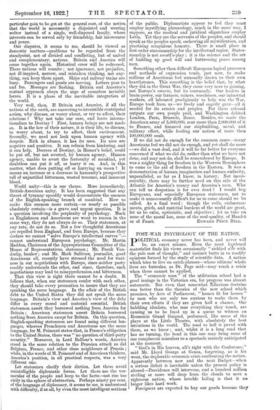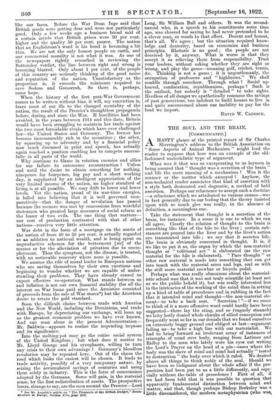POST–WAR PSYCHOLOGY OF THE NATION.
POLITICAL economy never has been, and never will be, an exact science. Even the most hardened materialist finds his views occasionally " sicklied with the pale cast of thought," and instinct butts in to modify opinions formed by the study of scientific data. A nation which tries to live on catch-phrases—whose citizens' whole lives are formulas, as Dr. Page said—may reach a crisis when these cannot be applied. The " economic man " of the utilitarian school had a good innings in the Victorian era, for progress was almost automatic. But even that somewhat 'fallacious doctrine was better than the theories of the new school which promises, by Acts of Parliament, " homes fit for heroes to men who are only too anxious to make them by their own efforts if they are given half a chance. Our babbling idealists, who mar everything they touch, are causing us to be lined up in a queue to witness an Economic Grand Guignol, performed, like some of the plays at the Little Theatre, with absolutely the best intentions in the world. The road to hell is paved with them, as we know ; and, whilst it is a long road that has no turning, the bend in this one may bring some of our complacent misrulers to a spectacle scarcely anticipated at the moment.
" God's in His heaven, all's right with the Conference," said Mr. Lloyd George at Genoa, forgetting, as is his wont, the deplorable economic crisis confronting the nation. Apparently between now and the next Budget—when a serious deficit is inevitable unless the present policy is altered—Providence will intervene, and a hundred million sterling or more will drop from the clouds to save a righteous nation, whose lovable failing is that it no longer likes hard work. Foreigners are expected to buy our goods because they like our faces. Before the War Dean Inge said that British goods were getting dear and were not particularly good. Only a few weeks ago a business friend said of a certain article that British prices were 50 per cent. higher and the quality 50 per cent. poorer. The notion that an Englishman's word is his bond is becoming a bit thin. We are not the only honest people on earth, and our commercial morality is not what- it was. As one of the newspapers rightly remarked in reviewing the Bottomley verdict, the line between right and wrong is becoming blurred. Only about 1 per cent. of the people of this country are seriously thinking of the good name and reputation of the nation. Unsatisfactory as the proportion is, it exceeds the minimum required to save Sodom and Gomorrah. So there is, perhaps, some hope.
When the history of the first post-War Government comes to be written without bias, it will, my conviction is, trace most of our ills to the changed mentality of the nation, the result of the Premier's thoughtless propaganda before, during, and since the War. If hostilities had been avoided, in the years between 1914 and this date, Britain would have been struggling to maintain her trade against the two most formidable rivals which have ever challenged her—the United States and Germany. The former has become immeasurably rich in the meantime ' • the other, by squaring up to adversity and by a financial policy now much discussed in print and speech, has actually again reached a position enabling her to compete success- fully in all parts of the world.
Why continue to blame in rotation enemies and allies for our failure to commence reconstruction ? Unless and until the desire to obtain something for nothing, ninepence for fourpence, big pay and a short working day, is supplanted by an intelligent appreciation of the very limited income of the nation, no higher standard of living is at all possible. We may drift to lower and lower levels. Yet the nation, proud of its war-time energies, is lulled into believing that it is well governed com- paratively—that the danger of revolution has passed because the menace was met by concessions from watchful statesmen who granted large measures of social reform as the lesser of two evils. The one thing that matters— our cost of production contrasted with that of other nations—receives very little attention.
War debt in the form of a mortgage on the assets of the nation of from 40 to 50 per cent. is actually regarded as an addition to national wealth, and is being spent on unproductive schemes for the betterment [sic] of the masses or for the alleviation of privation due to unem- ployment. Thus the symptom, not the disease, is treated, with no noticeable recovery where none is possible.
We assume the role of moral leader to European nations who are saving themselves by their own exertions and beginning to wonder whether we are capable of under- standing their problems. They have already ceased to expect effective co-operation. What stands between us and inflation is not our own financial stability (for all the interest on War loans paid since the Armistice consisted of proceeds from the sale of War stores*) but the American desire to retain the gold standard.
Soon the difficult choice between trade with America and the New World, including the Dominions, and trade with Europe, by depreciating our exchange, will loom up as the greatest economic problem we have ever known. And one man alone in the present Administration— Mr. Baldwin—appears to realize the impending impasse and its significance.
Into the melting-pot may go the entire social system of the United Kingdom ; but what does it matter to Mr. Lloyd George and his sycophants, willing to turn any crisis to their own advantage ? Germany's bloodless revolution may be repeated here. Out of the chaos the road which looks the easiest will be chosen. It leads to trade activity, possibly of a very temporary nature, by seizing the accumulated savings of centuries and using them solely in industry. This is the form of communism adopted by the Germans. Some will gain, in the material sense, by the first redistribution of assets. The prospective losers, strange to say, are the men around the Premier—Lord • See Mr. Asquith's article on " The Prospects of the BriUah Budget," Recon- struction in Europe, Section Five, page 269. Long, Sir William Bull and others. It was the second. named who, in a speech to his constituents some time ago, was cheered for saying he had never pretended to be a clever man, or words to that effect. Decent and honest, that's all. We agree ; but the situation required know- ledge and dexterity, based on economics and business principles. Rhetoric is no good ; the people are not deceived by it, anyway. What is worse is that they accept it as relieving them from responsibility. Trust your leaders, without asking whether they are right or wrong, and play the game—meaning golf, cricket, tennis, &c. Thinking is not a game ' • it is ungentlemanly, the occupation of professors and " highbrows." We shall muddle through somehow. Through what ? Social up- heaval, confiscation, republicanism, perhaps ? Such is the outlook, but nobody is " detailed ' to take sights. Heedless of all danger we apathetically consume the savings of past generations, too indolent to build houses to live in and quite unconcerned about our inability to pay for the food we import.
DAVID W. CADDICK.



































 Previous page
Previous page